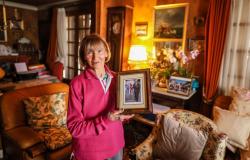Innovation Award Nominees
Here are the 3 nominees for the Innovation Tecoma Award
1 – Benoît Dumortier, founder of Greenskin

“Benoît Dumortier ©DR” – SIGN All rights reserved –
Benoît Dumortier began creating green walls around fifteen years ago, using a technique developed by Patrick Blanc, the French “father” of the specialty: clods of earth inserted under layers of felt, a fertilizing mixture of moss and bacteria on the support panel, in which the plant roots feed. Then he imagined a small transmitter and connected box, which sends alerts in the event of drying out, as well as a modular system, incubated at the Technopole, consisting of preparing the green walls before installation. Time savings, lower prices: Benoît Dumortier’s company, born in Bernica, wasted no time in attracting private and public clients. Renamed Greenskin and associated with EVE (Inexence group), it is experiencing strong development in the thermal renovation of public buildings market, starting with schools. Greening walls and roofs can significantly reduce the indoor temperature.
Last May, Greenskin inaugurated its first establishment in mainland France, in Boulogne-sur-Mer, where an establishment and work support service (Esat) begins to manufacture its patented modular support. The first orders are expected by the end of the year, with the first installations in spring 2025. With his partner Stéphane Boudrandi, Benoît Dumortier is developing a promising new product, already patented, in the field of “bio solar”: associated photovoltaic panels. with green facades.
2 – Julien Tenenbaum, founder of Flowly


Julien Tenenbaum ©Olivia Fourets
Julien Tenenbaum was still working for Transdev in 2016, when he filed his patent consisting of detecting WiFi and Bluetooth signals from smartphones in order to measure public transport ridership. In a logic of intrapreneurship, he began to develop a web interface, with his employer, and created Flowly in 2018. Sensors, installed in train or tram trains, buses or coaches, record the signals emitted by the telephones, completely anonymously, for the sole purpose of knowing when their owner boarded, and when he disembarked. Flowly offers its customers continuous monitoring of travelers’ origins and destinations, their waits at stops and their connections, and the production of performance indicators. Some of the first metropolitan networks placed their trust in it, word of mouth worked and Flowly won its first markets abroad: the Reunion start-up equips tram lines in Dublin, a train in the suburbs of Madrid… even before signing a first contract on the island, in 2021, with Citalis.
Flowly continues to invest in R&D. Winner of the France 2030 program within a consortium, it has expanded its offering to include the multimodal understanding of travel flows, always based on digital data. Julien Tenenbaum’s company supports more than 50 transport networks, it is the French number one in its market and is preparing to equip the Melbourne tram network. It employs around twenty people, the majority in Reunion.
3 – Rémi Voluer, founder of Seeds


“Rémi Voluer 2 ©DR”
Passionate about IT since his early childhood, Rémi Voluer began by obtaining a DUT in communication services and networks, then a degree in graphic design from Gobelins and a master’s degree from the National Conservatory of Arts and Crafts (CNAM) and, finally , a DESS in media sociology to “ensure that the tools developed are well suited to users”. He settled with his family in 2007 in Reunion, creating Seyes, a digital strategy and innovation consulting company. With Seeds, he also wanted to support local projects, supporting them, advising and financing. In a context where such structures are usually supported by public organizations, it is the first private innovation center in the Overseas Territories. Both an incubator, accelerator and resource center, it supports companies and project leaders in all sectors, from idea to development.
In eight years, Seeds has boosted nearly 100 impact projects in Reunion Island: a third of innovative projects aimed at the international market, a third of local businesses and a third of associative projects, mainly in cooperation or economic development. All together represents around 500 jobs, with a success rate of over 75%. Seeds is financed by the projects it supports and which plays the role of trusting entrepreneurs, investing alongside them, and being remunerated for success. Its only selection criterion if a project seems viable: that it brings a positive, strong and quantifiable impact to the Reunion area.







